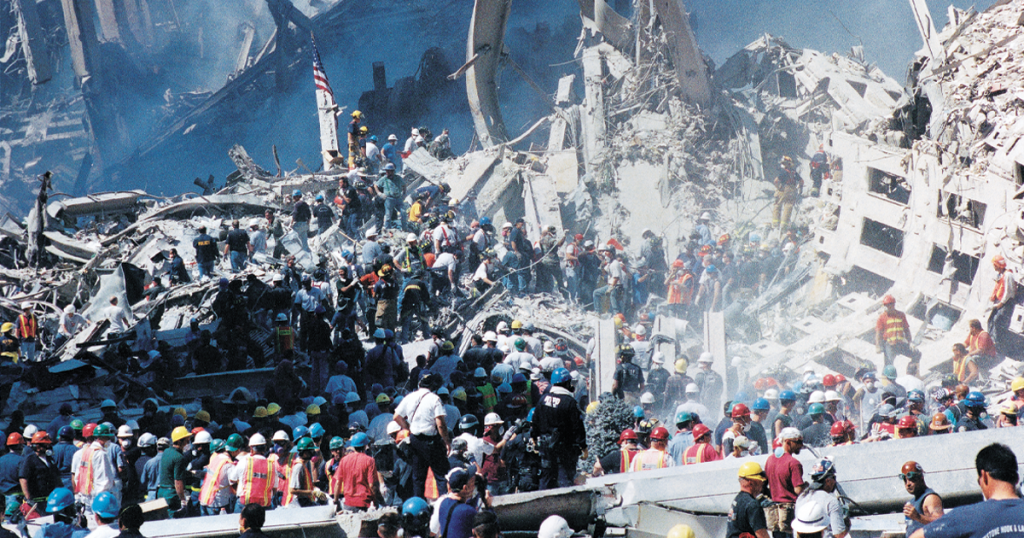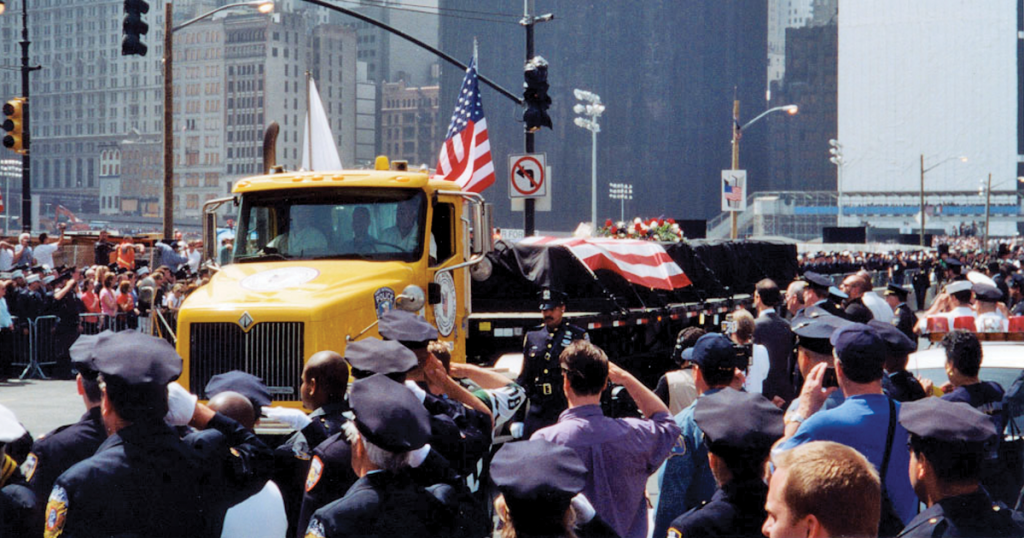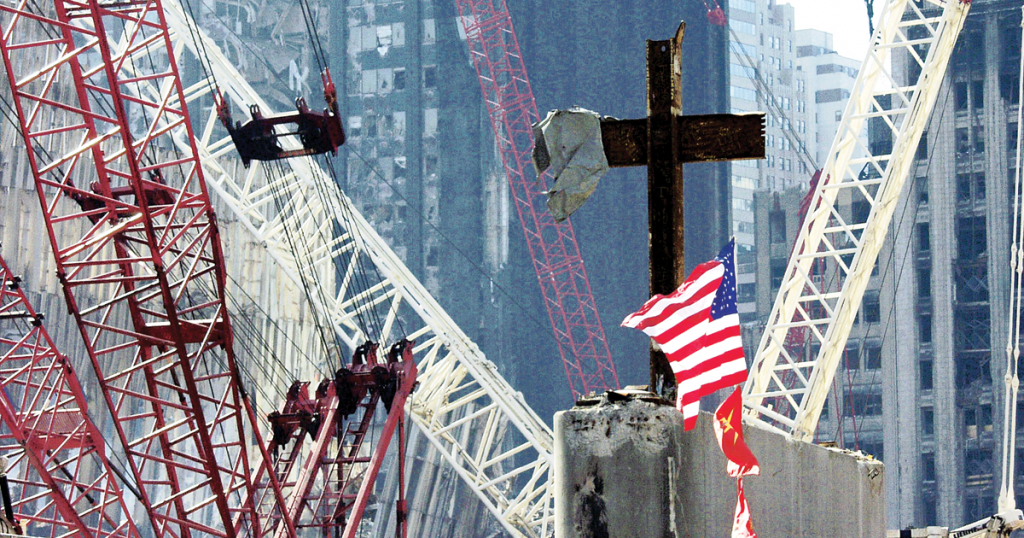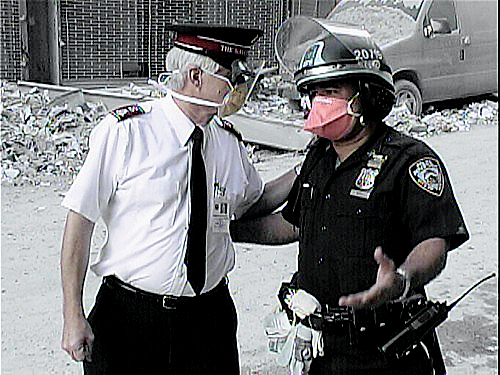Forever Changed, Thankful & Trusting
"We can trust in the Lord to bring us through the next challenge that will come our way."
Walking past the security barriers and into Ground Zero the first time was enough to take your breath away. It was an eerie, dark afternoon with huge plumes of steam rising over the collapsed area. The smell of the collapse was everywhere—dust and diesel fumes filled the air. Twisted steel beams and fire were visible. Faces were covered in ash, and dirt covered the gear of everyone on site. You could not escape the horror of what was once the majesty of the Twin Towers. The next few weeks would forever change me and the world we lived in.
Heartbreak was evident everywhere you looked. Several rubble piles stood over seven stories tall. People working feverishly on the massive grave sites to help anyway possible, knowing there was now little hope of finding anyone alive. Many of the workers I spoke with knew friends, family and colleagues that were buried in the rubble and yet they continued to search endlessly. The emotional strain was evident on their faces and in their voices. Not too many tears here, just a resolve to get the job done, no matter what.

I was serving hot chocolate to a chief in the New York City Fire Department when he asked that I not leave the area so I could assist his firefighters with the recovery of two of his fallen comrades. I stood by and asked my fellow chaplains for their support. The chief asked me to follow him up the hill—the tall pile of rubble—where the two fallen firefighters were found. I was given the American flag from the deputy chief, and when asked, I proceeded to the top of the hill, assisted by the extended hands of the firefighters who asked me to join them. After the fallen heroes were placed in body bags and moved to a stokes basket, I covered the firefighters with the flag and was tasked to lead the team in prayer for the families of the fallen heroes and their fellow firefighters—an honor I will never forget. The firefighters removed their helmets and stood at attention around their comrades as I led them in prayer. Then the men and women saluted their friends and lined up to pass the stokes basket to one another down the hill. My heart was heavy, yet joyful, knowing I was able to assist in some small way with this unspeakable recovery effort.
During my time at Ground Zero, I made some significant inroads with the police and FBI. They had seen me daily for over a week and considered me a part of the team. They would bring people to me to speak with. They discussed the effect of seeing bodies and body parts strewn all over a six-block radius and the part they were playing in cleaning up the area. Others talked to me about the triage operation and the pain and suffering the survivors went through. During these times of reflection, it was obvious that the police officers were reliving the pain over and over again.
I also developed a great rapport with the firefighters on site. I remember speaking with FDNY Battalion Chief O’Riley. He told me of the hours he spent on the scene initially and the work they had accomplished. He remained on the scene at Liberty Command for three days and slept for only four hours on a fire boat in the harbor. He didn’t realize during the first two days the massiveness of the disaster because he only focused on his own area at Tower 2, digging in the debris and the dust by hand, looking for anyone to move. He remained committed to the task of possibly finding someone alive, though he realized how improbable that was. He dug well past the point of exhaustion. Mentally and emotionally spent, he was changed forever.
While on duty at Liberty Command, the fire department chief asked me to go to the top of the hill again. They had found another firefighter in the debris. Captain Monty Wandling and I moved quickly to the scene, praying the entire time we carefully walked to the top. This time I knew what to expect and I was anxious. I arrived at the scene to find the remains of Firefighter Moldonaro buried in the rubble. The team of firefighters worked quickly to dig his remains out of the ground and we carefully placed him in a body bag, then on a stokes basket and covered him with the American flag. I led the men in prayer and, following this solemn time, the members saluted their fallen comrade and began to move the basket down the hill. I was asked to lead the basket down the hill this time, so I slowly marched in front as firefighters lined both sides, forming a great processional as they stood at attention and saluted a hero. I had the privilege of doing this six more times.

The Engine 10-Ladder 10 Firehouse was a place where healing was already taking place. It was located right next to the World Trade Center. The men of this Company were shell shocked at what happened to their neighborhood and to them. They had lost several men. They lost their equipment and their home. The community rallied around these individuals. It was wonderful to share with the men and women working on the pile. I had the opportunity to sit with many of these individuals for hours, eating and drinking with them in the mess hall and talking with them on the roof of their building. The relationship we were developing can best be described as inspiring. These men and women began to open up and share the pain they had been keeping inside. They shared about the tasks they were faced with on September 11th. After the towers collapsed, people ran to their facility looking for help—hundreds of people trying to escape. You could not see through the dust and debris coating the air, and breathing was next to impossible. The firefighters managed to help the injured until they could be transported to the hospitals, and they began the task of triage in the gruesome sites of carnage surrounding their building—city blocks in every direction in complete and total destruction. These were the ones who watched pieces of the plane fall before the collapse of the tower. They watched people leap to their death from 100 stories in the sky because there was no escape from the heat and flames and they did not want to burn to death. We talked about these horrible things, often finding some relief in a story about a baseball game or of a football team, but inevitably we returned to the scene and the events they had gone through. It was here where we would cry and pray. The conversations of those days left me drained emotionally, and I remember needing to find some moments of down time to recover.
I would return to The Salvation Army’s tent for refreshment, but no one understood or could have known the depths of what we had been experiencing at the site. We remained silent so as not to overwhelm them. I was so thankful for the sacrificial service and hard work of our Emergency Disaster Services volunteers. It was these individuals who made it possible for others to dig.
I remember these stories and so many others as though they just happened. These memories do not go away. I have learned to accept this fact and consider it a high honor when I am asked to share about The Salvation Army’s work following the terrorist attacks on the Twin Towers. I will be forever thankful for my friends who were there with me and have encouraged me through the years. Colonel Ralph Bukiewicz for his endless encouragement and support, and for Major Monty Wandling, my partner on the frontlines.

May God bless all those who served and now have the privilege to lead others in ministry. Having been through these difficult days, we can trust in the Lord to bring us through the next challenge that will come our way.
Lt. Colonel Robert A. Webster is Divisional Commander of the Army’s Midland Division, with headquarters in St. Louis.







